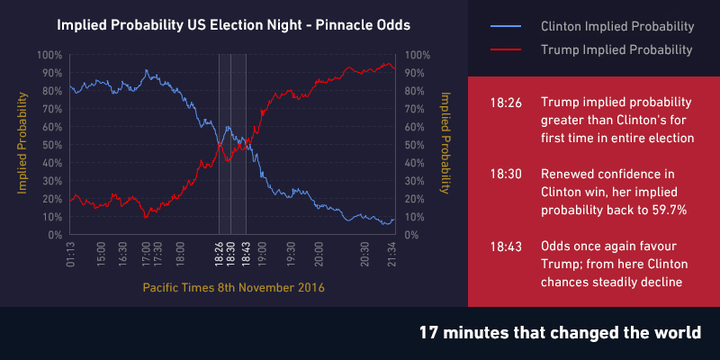Opinion is free, but information is very expensive, which is a harsh reality for bettors who derive an edge from reacting to news before the odds do. In an ever-more digitally connected world the volume of free opinion is rising exponentially, bringing us to the point of a ‘post-truth’ era. So how do you separate the signal from the noise, and what does the recent US Election tell us about that?

Successful betting is ultimately about the acquisition of accurate information; that can come as proprietary data feed or an overheard conversation. It really doesn’t matter, so long as the information is accurate, and you get it first.
The search for truth
For the majority of bettors however, without fibre optics, sophisticated models or contacts, this kind of crucial insight is beyond them; their information comes second-hand from the internet and social media, which presents a problem. Given that ‘information’ is so expensive those that know aren’t talking, and those that are talking often don’t know, yet human nature is a sucker for a story.
Winston Churchill is widely attributed to have come up with an aphorism that elegantly suggests why misinformation moves faster than fact. “A lie gets halfway around the world before the truth has a chance to get its pants on”.
‘Post-truth’ is the word of the year.
Of course it isn’t always as simple as information being right and wrong, true or false, but certainly a lot of what passes for insight has what could be called a questionable provenance. If this sounds like an exaggeration listen to Anthony Adornato, Assistant professor of journalism at Ithaca College’s Roy H. Park School of Communications talking about a survey conducted of US media [Forces at the Gate - May 9th, 20161].
“A third of respondents indicated their stations have reported information from social media that was later found to be false or inaccurate. One of the more striking findings of this study is, of those newsrooms that have social media policies, nearly 40 percent said the policy does not include procedures for verifying social media content before it is included in a newscast.”
Another 2015 study by the Media Insight Project2 suggested that 88% of millennials get news regularly from Facebook.
The Truth is Poetry
Without going overboard on quotations, there is perhaps another which touches more on human nature, and explains why lies or misinformation is often more interesting than reality. So the story goes Michael Lewis, author of the Big Short and Flash Boys, overheard this in a Washington DC Bar “The truth is poetry, but people f#cking hate poetry”.
This more visceral and blunt appraisal of our weakness for lies was used by Lewis as part of his commentary on the 2008 financial crash, and attempt to understand why so few people were prepared to challenge the prevailing thinking around the impending implosion of sub-prime mortgages.
Those few that were able to appreciate the poetry of what was happening right under the banks, regulators and ratings agency noses’ made a lot of money, and if anyone who aspires to do the same through betting – though maybe not quite at the same scale – might do well to think about what that means.
Misjudging Trump
Wind forward to the 2016 US Election and one of the biggest talking points was the sheer surprise of the result, and how it conflicted with the established opinion - betting, polls and financial markets.
Though sometimes the favourite does lose, similar failings in the 2015 UK General Election and Brexit suggests a real problem with the chain of information that fed the key indicators; certainly the true feeling among voters wasn’t reflected.

A lot of that has to do with the specific dynamics of trying to judge public sentiment at an arbitrary point in time (i.e. an election). Much of the aftermath has focused on the extent to which fake news may have misled the electorate - and by extension - bettors.
Yet ironically what may ultimately have fed Trump’s unexpected rise to success was the sense of certainty he offered voters - on the economy, immigration, defence - in such an uncertain world.
Fake News is Old News
There will certainly be several books and documentaries written about the subject and the word ‘post-truth’ is certain to feature heavily; it was the Oxford English Dictionary’s word of the year for 2016.
A state in which “objective facts are less influential in shaping public opinion than appeals to emotion and personal belief.”
But fake news isn’t really a new phenomenon. History is littered with great examples of fake news and before the printing press was invented most recorded knowledge was monopolised by gatekeepers such as Monasteries creating an inherent bias. Even after Guttenberg’s invention rumours still spread easily e.g the fire of London in 1666 where rumours of Catholic plots spread faster than the flames3 or the misquoting of Marie Antoinette4 - ‘Let them eat cake’ - leading to a revolution.
Confirmation Bias
One of the reasons why fake news is so successful is that it feeds on our desire to live in an echo chamber. We seek news that confirms our own view of the world as accurate, and modern technology makes that much easier as our online habits are tracked at every click and continuously fed back to us with information that matches existing behaviour and preferences.
This confirmation bias can be a vicious spiral that leads us to live in information silos. This is especially true of core beliefs, such as politics, but along with politics sporting opinions are often as zealously defended and deeply held.
What is important for aspiring bettors to consider in this ‘post-truth’ era is what they can practically do to improve their chances of obtaining accurate information. In the most basic sense you must act as your own editor and perhaps keep in mind an old newsroom wisdom ‘If your mother says she loves you, check it out.’
Tactics to consider:
- Employ critical thinking. The truth often lies somewhere between the extremes of opinion so try to avoid consuming news which simply reflects prior positions.
- Consider the source of the article and the data. Is it a syndication or an original?
- Wherever possible rely on hard data; where that isn’t available try a Bayesian approach.
- Beware of talking-heads; success in sport/politics doesn’t correlate to success predicting results/elections.
- Simply appreciating that markets can be led by human bias can itself be an edge.
- Sometimes the truth is unknowable and that is okay.
MORE: TOP 100 Online Bookmakers >>>
MORE: TOP 20 Bookmakers that accept U.S. players >>>
MORE: TOP 20 Bookmakers that accept Cryptocurrency >>>
Source: pinnacle.com
